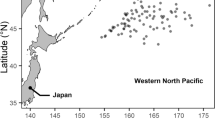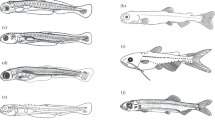Summary
Field observations of individuallytagged ocean surgeonfish (Acanthurus bahianus) indicated that schooling provided a foraging benefit: an increase in relative forging time. The magnitude of this increase differed among individuals, primarily due to time budgets of the fish when they were not in schools. The proportion of nonschooling time devoted to foraging was positively correlated with fish size, while the proportion of schooling time that was spent forging was similar for all individuals. Schooling tendency (percentage of time in schools) was positively related to magnitude of foraging benefit and negatively related to fish size. When fish size was held constant by partial correlation, schooling tendency remained positively related to foraging benefit. These results provide evidence that fish which derive a greater foraging benefit from school membership spend more time in schools.
Similar content being viewed by others
References
Barnard CJ (1984) The evolution of food-scrounging strategies within and between species. In: Barnard CJ (ed) Producers and scroungers. Chapman & Hall, London, pp 95–126
Berger J (1978) Group size, foraging, and antipredator ploys: an analysis of bighorn sheep decisions. Behav Ecol Sociobiol 4:91–99
Bertram BCR (1978) Living in groups: Predators and prey. In: Krebs JR, Davies NB (eds) Behavioural ecology, 1st edn. Blackwell, Oxford, pp 64–96
Caraco T (1979a) Time budgeting and group size: a theory. Ecology 60:611–617
Caraco T (1979b) Time budgeting and group size: a test of theory. Ecology 60:618–627
Foster SA (1985) Group foraging by a coral reef fish: a mechanism for gaining access to defended resources. Anim Behav 33:782–792
Giraldeau L (1984) Group foraging: the skill pool effect and frequency dependent learning. Am Nat 124:72–79
Godin JJ, Morgan MJ (1985) Predator avoidance and school size in a cyprinodontid fish, the banded killifish (Fundulus diaphamus Lesueur). Behav Ecol Sociobiol 16:105–110
Helfman GS (1984) School fidelity in fishes: the yellow perch pattern. Anim Behav 32:663–672
Itzkowitz M (1974) A behavioural reconnaissance of some Jamaican reef fishes. Zool J Linn Soc 55:87–118
Krebs JR, Barnard CJ (1980) Comments on the function of flocking in birds. Acta XVII Congr Int Ornithol, Berlin, pp 795–799
Magurran AE (1986) Individual differences in fish behaviour. In: Pitcher TJ (ed) The behaviour of teleost fishes. Croom Helm, London, pp 338–365
Magurran AE, Pitcher TJ (1983) Foraging, timidity and shoal size in minnows and goldfish. Behav Ecol Sociobiol 12:147–152
Magurran AE, Oulton WJ, Pitcher TJ (1985) Vigilant behaviour and shoal size in minnows. Z Tierpsychol 67:167–178
Monaghan P, Metcalfe NB (1985) Group foraging in wild brown hares: effects of resource distribution and social status. Anim Behav 33:993–999
Morse DH (1977) Feeding behavior and predator avoidance in heterospecific groups. Bio Science 27:332–339
Ogden JC, Lobel PS (1978) The role of herbivorous fishes and urchins in coral reef communities. Env Biol Fish 3:49–63
Partridge BL (1980) The effect of school size on the structure and dynamics of minnow schools. Anim Behav 28:68–77
Pitcher TJ (1986) Functions of shoaling behaviour in teleosts. In: Pitcher TJ (ed) The behaviour of teleost fishes. Croom Helm, London, pp 294–337
Pitcher TJ, Magurran AE (1983) Shoal size, patch profitability and information exchange in foraging goldfish. Anim Behav 31:546–555
Pulliam HR (1973) On the advantages of flocking. J Theor Biol 38:419–422
Pulliam HR, Caraco T (1984) Living in groups: Is there an optimal group size? In: Krebs JR, Davies NB (eds) Behavioural ecology, 2nd edn. Sinauer, Sunderland, Mass, pp 122–147
Reinthal PN, Lewis SM (1986) Social behaviour, foraging efficiency and habitat utilization in a group of tropical herbivorous fish. Anim Behav 34:1687–1693
Robertson DR, Sweatman HPA, Fletcher EA, Cleland MG (1976) Schooling as a mechanism for circumventing the territoriality of competitors. Ecology 57:1208–1220
Rohwer S, Ewald PW (1981) The cost of dominance and advantage of subordination in a badge-signalling system. Evolution 35:441–454
Shulman MJ (1985) Coral reef fish assemblages: intra- and interspecific competition for shelter sites. Env Biol Fish 13:81–92
Siegel S (1956) Nonparametric statistics for the behavioral sciences. McGraw-Hill, New York
Sokal RR, Rohlf FJ (1981) Biometry, 2nd edn. Freeman, San Francisco
Sullivan KA (1984) The advantages of social foraging in downy woodpeckers. Anim Behav 32:16–22
Werner EE, Gilliam JF (1984) The ontogenetic niche and species interactions in size-structured populations. Ann Rev Ecol Syst 15:393–425
Wolf NG (1983) Behavioral ecology of herbivorous reef fishes in mixed-species foraging groups. PhD dissertation, Cornell University, Ithaca, NY
Wolf NG (1985a) Odd fish abandon mixed-species groups when threatened. Behav Ecol Sociobiol 17:47–52
Wolf NG (1985b) Food selection and resource partitioning by herbivorous fishes in mixed-species groups. Proc Fifth Int Coral Reef Congr 4:23–28
Author information
Authors and Affiliations
Rights and permissions
About this article
Cite this article
Wolf, N.G. Schooling tendency and foraging benefit in the ocean surgeonfish. Behav Ecol Sociobiol 21, 59–63 (1987). https://doi.org/10.1007/BF00324436
Received:
Accepted:
Issue Date:
DOI: https://doi.org/10.1007/BF00324436




